Schedule Your Week for Maximum Impact | By Brian Jones
Pastors can accomplish more for the Kingdom and grow churches effectively by maximizing their time.
One of the first things I do when I begin coaching a senior pastor is lead them through a process of redesigning how they schedule their week to ensure their highest ministry priorities get consistently accomplished.
It is the same process whether they serve churches of 50 to 5,000.
Here’s what that process looks like:
Draw a calendar.
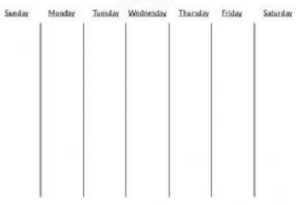
The first thing I have senior pastors do is pull out a piece of paper and turn it to horizontal view.
Then I ask them to draw six horizontal lines, representing a typical weekly calendar, and placing the days of the week up at the top.
Mark Xs on FRIDAY and SATURDAY slots for your days off.
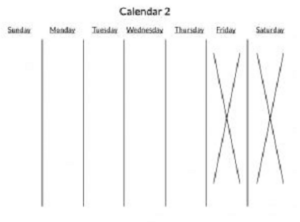
Your work week is now Sunday through Thursday. No more work on Fridays and Saturdays.
This immediately presents two problems for the typical senior pastor. First, they’re still doing their sermons on Friday and Saturday. Second, they take Monday off.
Both of these will change overnight if I have anything to do with it, and your family and church will thank me.
If you listen to me, you’ll never work on another sermon on Friday and Saturday again. In fact, you’re going to get your sermons done by the end of the day Monday (at the latest). More like noon every Monday.
And that Monday off thing? Yep, killing that too.
The only thing we have control over in ministry is ourselves. This is why the most important thing you need to prioritize with regards to ministry is two consecutive days off a week to focus on self-care.
Many senior pastors schedule Mondays off because they are exhausted from Sunday. When they choose to do this, they’ve fallen prey to the fallacy of “causation vs. correlation.” Simply because you’re exhausted on Monday, doesn’t mean that what happened on Sunday was the cause of that. Just because one day follows the other, does not mean there is a causal relationship between the two.
The reason senior pastors are tired on Monday is because they didn’t mark off, hold sacred, and invest themselves in TWO FULL days off immediately before Sunday. In fact, I am hurrying to finish this article because I have a day of hiking planned in the mountains, and I can’t wait to get away.
Identify your daily energy reservoirs, from highest to lowest.
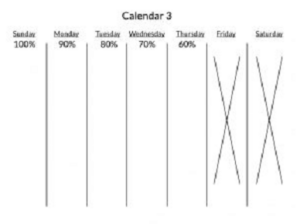
Next, I ask senior pastors a question: “If you were to begin investing in yourself by creating two-day experiences that rejuvenate your soul, in addition to working out 6 days a week, eating right, guarding your sleep like a hawk, etc., on a scale from 1 to 100, what would be your energy reservoir be going into Sunday morning?”
The right answer: 100% of course.
How about Mondays? Your energy would be at 90%.
Tuesdays? 80%
Wednesdays? 70%
And your final workday? Thursdays? You will be at your lowest, say, around 50-60%.
As senior pastors our energy reserves decrease by at least 50% over our five-day work week, hence the need for rejuvenation at the end of each week.
What I do at this step is have senior pastors write under each day of the week the percentage of energy that is in their reservoir available for ministry that day.
Place your SIX highest priorities on days that correspond with the energy needed.
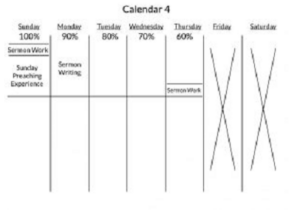
You will not be at 100% each day. Energy is divested as the week progresses.
The problem many senior pastors have is they do their most important mental task (i.e., sermon writing) later in their work week when their energy is most depleted.
We’re going to fix that.
Ministry Priority #1: The Sunday Preaching Experience
Let’s start by asking, “What’s the number one priority for any senior pastor?”
That’s easy: the Sunday morning preaching event when you teach the Bible, cast vision, hug and pray for as many people as you can, etc. Whatever you want to call “that” experience, that’s your number one priority. Think about it: that one-hour event (out of a 50+ hour work week) will impact more people than the rest of your work hours combined. Treat it as such.
Let’s do two things at this point.
First, let’s draw a line horizontally across the weekly calendar starting on Sunday through Thursday at 12:00 noon to show a break between mornings and afternoons/evenings. That will be important in a second.
Second, let’s write down “Sunday Preaching Experience” in that Sunday morning box.
Ministry Priority #2: Sermon Writing
What’s the second most important priority for every senior pastor?
Again, that’s easy: sermon writing.
Into what box should that go? Again, you guessed it — the day when you have the most energy left to complete that task: Monday.
You need to complete your next most important task on the day when you have the greatest levels of energy left in reserve. Again, many will say I’m wiped after Sunday. My first response is, “Don’t we all have construction workers in our congregations who are exhausted after 12 hours of manual labor? Wouldn’t we call that true exhaustion? Let’s stop whining.” My second response: “If you’re tired on Monday I guarantee it is because you didn’t INVEST in your two days off.”
What I’m going to propose is that you actually write your sermons by noon on Monday and be done with it.
Many senior pastors will balk at that until we dig into and change how they actually write their messages. Most senior pastors write their sermons in a 4- to 5-hour flurry of activity anyway, only later in the week.
What we’re going to do is move that flurry of activity to early on Monday, so when they’re finished, they will feel like a new person. When this happens consistently, they will feel like a noose has been loosened because message prep is no longer “hanging over them.”
Listen to me, forget the blowhards who shame you with their advice on how preaching “should” be done. Write according to the way God designed YOU, not someone else. Each senior pastor has a unique, God-given approach to sermon writing that is unique to them, BUT, that unique expression must be still done in a way that maximizes the energy flow of your week.
I want you to think about long-term preaching consistency, not pursuing the occasional home run. That killer “home run” sermon you wrote late on a Saturday night two years ago is a statistical anomaly. Preach long enough and anyone will hit a homerun.
I want you to focus on getting to second base every time at bat. Writing your sermons on Mondays is key to making that happen.
What I’m also going to suggest is that your Mondays are completely blocked off — no standing meetings, no going into the office — you block that day off and lock yourself up in a hole until that sermon is done.
Then you let the sermon “sit” on Tuesday and Wednesday. Don’ touch it.
Then at 10:30 a.m. on Thursday you pull it back out for a one-hour refresher before it goes out to get prepped for slides. So, let’s put that 10:30 a.m. Thursday sermon work on the calendar.
Don’t touch it Friday and Saturday either. Put a little sticky note on your laptop that says “DO.NOT.EVEN.THINK.ABOUT.IT.OR.YOU.WILL.DIE.”
Train yourself to have rigid conceptual barriers. Train yourself to compartmentalize your work/time off. Literally, train yourself to think like a stoic philosopher.
SIDENOTE: In fact, if you can’t mentally “give it a rest” I would suggest that you read some great works on Stoic Philosophy which will help you train your mind to lead at the next level. One is The Obstacle Is the Way by Ryan Holiday. The other is The Moral Letters to Lucilius by Seneca. You can find the audio version of The Moral Letters on audible.com (called The Tao of Seneca). It’s a three-volume set and worth its weight in gold. I listen to these letters all the time in the car or while doing the dishes.
The last time you touch your sermon is early Sunday morning. You pull it out again for an hour to revise, rehearse, make changes, etc. Add that hour to your calendar as well, and that’s all the time you’ll spend on a sermon, except for advance sermon planning, which we’ll get to in a bit.
⦁ Envision everything BEFORE 12 p.m. as “Personal Time” and everything AFTER 12 p.m. as “People Time.”
In your mind, there should be a clear conceptual break between mornings and afternoons/evenings on Tuesdays, Wednesdays, and Thursdays.
Mondays are already blocked off — no meetings or any standing commitments there. That day is totally devoted to sermon writing.
Going forward, I want you to commit to yourself and your team that 5:00 a.m. to 12:00 p.m. Tuesday, Wednesday, Thursday is “you and God time.” Period. No last-minute meetings scheduled. No breakfast appointments. Nothing.
That time is to be reserved for (1) extended times of study in God’s word (2) advanced exegesis and sermon work and (3) creative advanced sermon series planning.
Go ahead and put into your Tuesday through Thursday morning boxes “Personal Study and Planning.”
What about working out?
My assumption is you will get up first thing and work out, then come back and have a time with God and then get your day started.
Yet, for me, sometimes I’m up at my desk at 3:50 a.m. writing and will keep going until 8:00 a.m., then go to the gym. Sometimes I’ll go to the gym at 10:15 a.m. (if it’s a weightlifting day) if my thinking, planning, and reflection are on fire and I don’t want to stop.
These mornings are when you read books, exegete Matthew 16 for an upcoming series, and pull out a piece of paper and ask Tom Patterson’s Four Helpfuls: What’s right? Wrong? Missing? Confused? as you are evaluating some area of your church.
This is when I watch myself preaching. Yes, once a week I watch myself preach, looking for ways to improve.
This is the time when I flesh out ideas for future sermon series.
Do I have a set, rigid plan for when/how all of these activities play out? Nope. I just know these “personal activities” (i.e., things that must be done by me when I’m alone) happen within these morning slots.
⦁ Strategically place staff meetings into your TUESDAY and WEDNESDAY slots in order of priority.
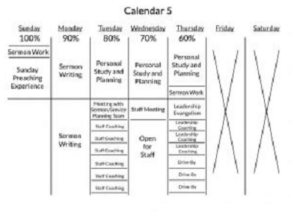
The first thing I tell a senior pastor to schedule on Tuesday afternoon is a standing lunch meeting to plan their worship services.
Ministry Priority #3: Meeting with Sermon/Service Planning Team
Every Tuesday, without fail, I meet with our two worship pastors and my outreach pastor to plan our services. We do it over lunch. That meeting lasts from 11:30 a.m. to 1:30 p.m., give or take 15 minutes.
This meeting was done with volunteers in the past, then moved to all staff, then only these three people. This group evaluates the service from the past Sunday and plans the upcoming services and sermon series. If you’re in a smaller church, you’ll need to do this in the evening.
Ministry Priority #4: Coaching Staff
Until you have an executive pastor, you’re “it” when it comes to coaching staff.
Everyone in your church, regardless of whether or not they are staff, must have three things in place to succeed:
⦁ Responsibility (for what am I responsible?)
⦁ Authority (ability to do my job without micromanagement)
⦁ Coaching (input on how I can get better and where I need to focus to help fulfill the church’s mission).
Here’s the process I encourage every senior pastor I coach to adopt:
⦁ Block out Tuesday afternoons for staff coaching.
⦁ Set up a weekly 30-minute meeting with leaders of your five main departments (children, students, adults, worship, operations/finance).
⦁ Leave 15 minutes between each session.
⦁ Have your staff members (or volunteer leaders) bring you what we call our “4x4x4” to the meeting. A “4x4x4” is a one-page sheet of paper where the staff member has identified the top four tasks to accomplish and the top four people to meet with over the next four weeks.
⦁ In that 30-minute meeting give them feedback, direction, and prayer support.
⦁ As they become more focused and productive, you move the meetings back to every other week, then monthly.
⦁ You do this with the five leaders you directly oversee, as well as your treasurer who will come with bills to be paid, a balance sheet, an AP summary, etc.
For senior pastors of smaller churches, I recommend that they do this on late Sunday afternoons once a month with their “staff” of volunteers.
Ministry Priority #5: Staff Meeting
The fifth thing every senior pastor must schedule is their meeting with their staff. I tell all senior pastors I coach that this needs to be on Wednesday from 12:00 noon to 1:30 p.m.
Always eat together. We brown bag it. I always ask an icebreaker type question to get the team to share. Then I usually have selected some vision-casting element — a video, a blog post, or a chapter of a book. Then we discuss 2-3 items that affect the entire staff/church. Decision-making is pushed down to your Tuesday meetings with department leaders. We end with a time of prayer, and we always keep it to 90 minutes.
This meeting is for vision and community building. No-one is allowed to schedule anything that will conflict with this meeting. If they do, trust me, they never will again. Just ask people on my staff. No-one misses this meeting, that’s how important it is.
When you’re small you invite everyone — secretary, your part-time worship person, etc. The larger you get, it becomes just for ministry staff. When you’re smaller you’re obviously limited by when people can be there if they’re volunteers or part-time, so find a time when you can all get together and stick to it. It may begin with a monthly lunch after church, or a time later on Sunday afternoon.
I encourage you to leave Wednesday afternoons open. If your staff meeting is from 12:00 to 1:30 p.m., then leave 1:30 p.m. to 5:00 p.m. open to simply be available, walk around, and trouble shoot.
⦁ Leave THURSDAYS open for leadership development and “drive-by” meetings.
The next highest priority for any senior pastor is finding, leading to Christ, mentoring, then releasing into ministry high-capacity leaders.
This happens at lunch on Thursdays.
Ministry Priority #6: Leadership Evangelism Meetings
I ask every senior pastor I coach to create a list of the 100 most influential people in the community and meet every single one of them by the end of our one-years’ worth of coaching. Most of these meetings will occur during lunch on Thursdays.
I also ask these senior pastors to rank, in order, the leadership ability of every single person they know in the church, arriving at their top 100 leaders list. I ask them to begin developing those people by reaching out to them and meeting with them as well. These meetings will happen on Thursday during (or after) lunch in the afternoon.
If, and only if, there are spots available, the senior pastor will take what I call “drive-by” appointments, not because they aren’t important people initiating them, but because they are “out of the blue.” These appointments are for people that tell you the world is going to end if you don’t meet THIS WEEK. In many cases, for them, it feels like their world is ending. But you can’t respond accordingly.
You respond to these people by saying, “Great, how about Thursday at 4:00 p.m.?
If another person asks, “Can I meet? It is a life-or-death emergency!” You respond, “Sure, how about 3:00 p.m. Thursday?” Then 2:00 p.m. Then 1:00 p.m. After that, your Thursday is full, and you schedule them for the following Thursday.
You never schedule “drive-bys” for a Monday. That entire day is already taken. As is Tuesday or Wednesday. You force yourself to do “drive-bys” on Thursdays only. If this is a legitimate need that can’t wait, then this is why you have elders and other leaders in the church.
Your primary job is to teach God’s word (Acts 6:2) and to equip God’s people for works of service (Ephesians 4:2), not functioning as an on-call counselor. The last thing you do is drop all of the other priorities you have in your week to deal with something that isn’t truly an emergency.
You and I know what an emergency looks like, and 99% of these requests aren’t it. If something is an actual emergency, of course we make exceptions. But these are rare.
The way I deal with requests “to talk” is first I always tell people “tell me right now.” There’s no need for me to cancel an existing meeting, neglect my priorities, drive somewhere for lunch, and then spend an hour and a half discussing something that could have been handled in 4 minutes after I just finished preaching on a Sunday morning.
I also make it known that I will be available on Sundays between 8:30 am and 1:00 p.m. I stand in line and talk and pray with people until the last person leaves. Most people who say the world is going to end (a) end up only needing to talk for 3-5 minutes and/or (b) they actually do need to see a counselor. I DO NOT do counseling; instead, I send such requests directly to the counselors that we have at our church or a great Christian counseling agency in our area.
Here’s the thing: Can you imagine someone coming up to the Apostle Paul in a gathering in Corinth and asking, “Can we schedule a time to talk later this week? I’m having a hard time.” Can you imagine?! Paul would say, “No, that’s what this community is for! Let’s talk RIGHT NOW.”
Stop undermining the power of the worship gathering by adding time later in the week to deal with things that God meant to be dealt with IN THE SERVICE and by God’s people. That is why we have churches services, isn’t it?
Putting It All Together
After years of coaching senior pastors and years rubbing shoulders with some of the most effective servant leaders around, I can tell you that what separates them from the pack is how they use their time.
Effective and ineffective senior pastors usually share the exact same priorities:
⦁ Ministry Priority #1: The Sunday Preaching Experience
⦁ Ministry Priority #2: Sermon Writing
⦁ Ministry Priority #3: Meeting with Sermon/Service Planning Team
⦁ Ministry Priority #4: Coaching Staff
⦁ Ministry Priority #5: All Staff Meeting
⦁ Ministry Priority #6: Leadership Evangelism Meetings
What differentiates senior pastors who are getting results from those who aren’t is how tightly they structure their week to ensure that they can stay focused on accomplishing their top priorities.
They have learned how to say NO, without guilt.
They have also learned that if they move outside of their priorities and get caught up in other things it doesn’t just hurt them, but their staff, and the entire church as a whole.
As Peter Drucker noted in a chapter entitled “Know Thy Time” in his masterful book, The Effective Executive, “Effective executives, in my observation, do not start with their tasks. They start with their time. And they do not start out with planning. They start by finding out where their time actually goes. Then they attempt to manage their time and to cut back unproductive demands on their time. Finally, they consolidate their “discretionary” time into the largest possible continuing units.”
That is as true in “church world” as it is in business.
I tell senior pastors I coach: “The future growth and impact of your church is ALL about you AND has absolutely nothing to do with you.”
So, know thy time, friends.
Know thy time.
To learn more about Brian Jones, click here. You can read his blogs at BrianJones.com. This article originally appeared on Senior Pastor Central.






